By Zuleyka Zevallos
Adam Serwer reports in Mother Jones that George Lucas’ latest film, Red Tails had trouble getting made, partly because the “studios weren’t willing to finance a film without a White protagonist as an anchor”. Lucas’ claim can be put into wider historical context by examining the entrenched racist practices of big Hollywood studios. In particular, the idea of the “magical negro trope” puts things into perspective. This term refers to the way valiant Black characters in movies exist only as a narrative device to teach the White protagonist how to be a better person. I also delve into other variations of the “magical negro” and the gendered dimensions of these characters. Hollywood studios bemoan that paying audiences have stopped going to the cinemas. Is it any wonder, when big productions treat us all as if we’re stuck in some arcane mono-cultural bubble?
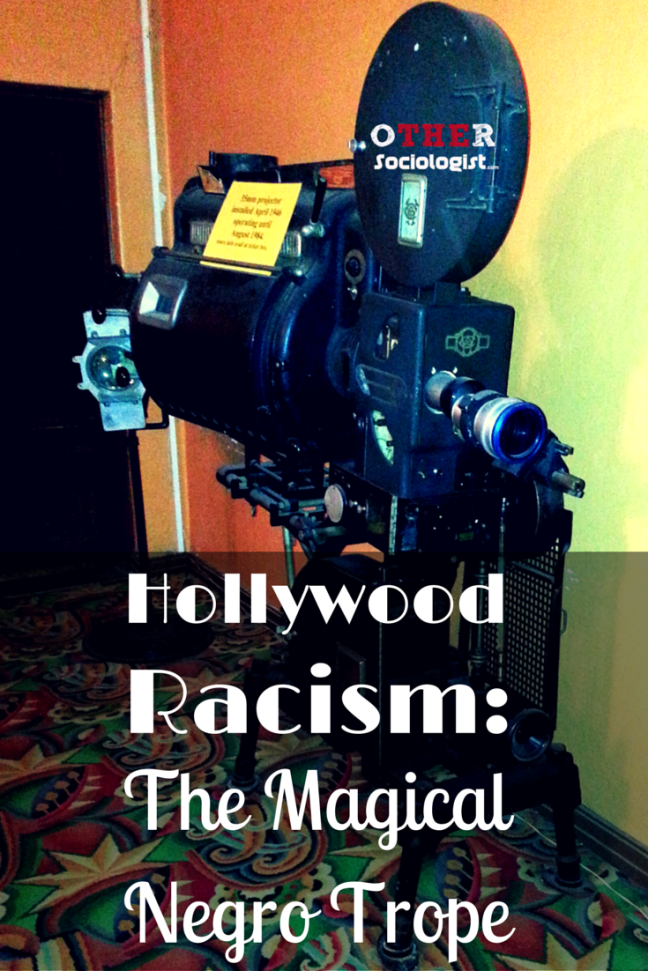
The Magical Negro Trope
Red Tails was written by John Ridley (U Turn; Three Kings) and directed by Anthony Hemingway (The Wire; Treme). It stars Cuba Gooding Jr. and Terrence Howard. Here is the plot as described in Mother Jones:
The movie is a World War II-era action flick based on the Tuskegee Airmen, the heroic and decorated pilots who were the first Black service members to fly combat missions at a time when Black Americans were not recognized as full citizens in the United States, despite their willingness to fight and die in its defence.
Lucas’ claim that Hollywood was unwilling to fund such an interesting premise for a historical drama makes me think about something I read a long time a go, about the “magical negro trope”. Christopher John Farley noted in his Time Magazine article back in 2000 that the first movie that featured spoken dialogue was a film called The Jazz Singer. It included “a White guy in blackface”. Since then, the magical negro has been a recurring fixture of Hollywood’s imagination.

Author Nnedi Okorafor-Mbachu cites the 1958 film The Defiant Ones as the first, most prominent example of the magical negro trope. In this film Noah Cullen (played by Sidney Poitier) sacrifices his freedom to help John “Joker” Jackson (played by Tony Curtis).
Okorafor-Mbachu notes that the magical negro is a narration device that seemingly subverts racism (after all, it portrays Black characters as virtuous). In fact, however, this character is centrally about maintaining historical power relations. Richard Brookhiser argues that America has long loved the idea of the numinous negro, that is, African-American politicians, preachers and movie characters that lift up the spirits of White audiences. He notes this is in contrast to the “thuggish” characterisation of African-Americans that is also prevalent in the American psyche. Brookhiser’s point is that African-Americans are only allowed to be at either extreme – criminal or saint. They cannot be complex and flawed human beings, either in fiction or in public life. The magical negro is one variation of the numinous negro.
Okorafor-Mbachu, director Spike Lee and other cultural critics have argued that while the magical negro may have been Hollywood’s first minority group stamped onto celluloid, Hollywood uses the same characteristics of the magical negro to “positively stereotype” other minority groups. This includes other people of colour, with a special fixation on Indigenous cultures (also known as the noble savage trope); disabled people (refer to the inspirationally disabled trope); socially disadvantaged individuals, primarily poor people of colour (the White man’s burden); and lesbian, gay, bisexual and transgender (LGBT) groups (see the magical queer trope) . Okorafor-Mbachu describes the gambit of magical minorities this way:
- He or she is a person of colour, typically Black, often Native American, in a story about predominantly White characters.
- He or she seems to have nothing better to do than help the White protagonist, who is often a stranger to the Magical Negro at first.
- He or she disappears, dies, or sacrifices something of great value after or while helping the White protagonist.
- He or she is uneducated, mentally handicapped, at a low position in life, or all of the above.
- He or she is wise, patient, and spiritually in touch. Closer to the earth, one might say. He or she often literally has magical powers.
In connection to the final point above, the TV Tropes website describes that the magical negro is imbued with “deep spiritual wisdom” and sometimes even supernatural powers, but they never act as “the hero” because their sole purpose is to help the White lead become a better person/leader/warrior. Think of almost every movie plot involving a White and person of colour duo, from the optical sci-fi wizardry of The Matrix to the emotional gravitas of The Shawshank Redemption.*
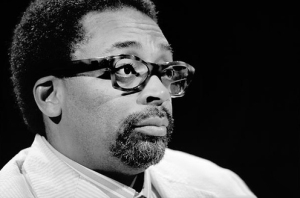
Spike Lee used the “magical, mystical Negro” concept during a lecture with Yale University students in 2001. Lee cites examples such as The Family Man, What Dreams May Come and The Green Mile, but he focuses his critique on The Legend of Bagger Vance, set in the Southern USA state of Georgia during the Depression. The film sees Will Smith playing the eponymous Vance who teaches Matt Damon’s character how to golf like a pro. Lee notes incredulously: “Blacks are getting lynched left and right, and [Bagger Vance is] more concerned about improving Matt Damon’s golf swing!” Lee continues in his lecture:
How is it that Black people have these powers but they use them for the benefit of White people? ….I gotta sit down; I get mad just thinking about it…They’re still doing the same old thing … recycling the noble savage and the happy slave.
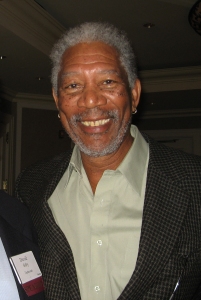
The website TV tropes has an extensive list of examples of the magical negro trope from film, television and other genres. Morgan Freeman features in many examples. An exceptionally talented actor, Freeman is often cast as a benevolent sage with mystical qualities in films such as Driving Miss Daisy, Shawshank, and Million Dollar Baby. Morgan best embodies the supernatural power of the magical negro trope in the Bruce Almighty and Evan Almighty films where he plays the personification of God. Even when playing one of the world’s best-known social activists in his role as Nelson Mandela, Freeman’s character is the second-fiddle inspiring the White South African rugby captain to victory in Invictus.
Okorafor-Mbachu also points out that Stephen King often uses the “Super-Duper Magical Negro” as a literary trope in his most famous novels: The Green Mile, The Talisman, The Stand, and The Shining. TV Tropes writes of the magical negro:
So enlightened and selfless is he that he has no desire to gain glory for himself; he only wants to help those who need guidance…which just happens to mean those who are traditionally viewed by Hollywood as better suited for protagonist roles, not, say, his own oppressed people.
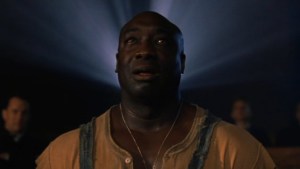
It may appear that cinema has come a long way in recent decades. After all, Marlon Brando played a Japanese man The Teahouse of the August Moon in 1956 and Mickey Rooney played a gross “yellow face” caricature of a Chinese landlord in Breakfast at Tiffany’s in 1961. Then again, people of colour are rarely central figures in widely distributed movies, TV shows, computer games or in any other mainstream cultural production.
When minorities are top billed, they are often sidekicks, best friends or “token” characters. This has been satirised (poorly) in the animated series Southpark where the only African-American character is actually named “Token”. Slick horror films often have a running gag where an African-American character will point out that Black people are often the first to die. They then consequently proceed to fulfil their prophetic joke. (Black Horror Movies has done a fantastic job of chronicling this phenomenon.)
No matter the genre, with the exception of some action movies** and a couple of big-name actors such as Denzel Washington and Will Smith, movie heroes are almost uniformly White, heterosexual, able-bodied men.
War as White Man’s Territory
Irrespective of whether or not you like watching War films, this genre is dominated by the heroism of White, hetero, buff male soldiers. Women soldiers are rarely depicted as central characters in war movies, except in sci-fi (see Sigourney Weaver as Ripley in the Alien films). Outside of this genre, women are side characters, the disposable “best buddy” who is “one of the guys” and who usually dies, or they are victims of rape (brutally depicted in The General’s Daughter).
In the world of film, women are more likely to be cast as nurses and long-suffering love interests. Doesn’t this simply reflect the reality of war? Not really. Women have made extraordinary contributions during conflicts in different countries and throughout history. Here’s a couple of examples.
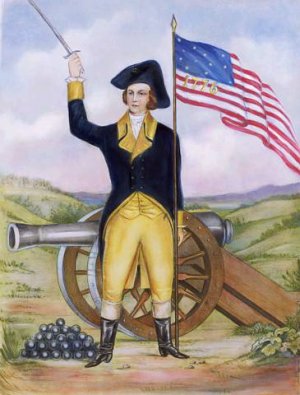
In 1782, American Deborah Sampson enlisted in the Continental Army disguised as a man. She was wounded in battle and later sued the military for her veteran’s pension and eventually won. This was no easy feat, as Sampson had to successfully argue she was entitled despite the fact that she lied about her identity and in spite of the fact that women were not allowed to enlist in the first place. She became a teacher and one of the first women to travel around America as a public speaker, educating people about her military experiences. Her story has yet to be made into a feature film.
Isn’t Sampson’s case exceptional and not the norm? In which case, one might argue that depicting women’s military contributions wouldn’t be true to life. After all, it is mostly men who have lost their lives in various wars. Yes, that’s true, to an extent. In most Anglo and European societies, women have not served in the military in equal numbers, but there are various precedents for their notable leadership and sacrifice. (Read More below.) Besides, all war movies celebrate exceptional cases of individual characters. Just not those involving women. Not unless their femininity is problematical.
The well-crafted Courage Under Fire film from 1996 tells a wholly fictional story about Karen Walden, an Army Captain played by Meg Ryan. Denzel Washington plays the officer investigating whether Walden should be posthumously awarded the Medal of Honour for valour in combat. Different accounts of Walden’s story are told by the men who were under her command. Part of the conflicting narratives focus on whether or not Walden cried right before she died and whether this was because she was afraid or because she was tired. (Valiant male soldiers who cry under duress would not be awarded medals, you see.) Walden’s masculine traits are under investigation as much as her actions as a military leader. This is why women’s experiences of war are missing from films – they are too girly. Girls and their tears belong in romcoms, thank you very much.
Magical Negro at War

African-Americans have similarly made a significant but poorly depicted contribution to the American military. A good example to contrast with what Red Tails is reportedly trying to achieve is the 1989 film Glory. This is a fictionalised retelling of one of the first American Army units staffed almost entirely of African-American men. The film is told through the eyes of the White commanding officer (Matthew Broderick). In line with the racist practices of the time, the higher officers of this unit were White; however, this unit is historically distinguished because of the contribution of African-Americans. The film has a superb cast that deliver powerhouse performances; yet rather than interweaving Broderick’s character into the broader narrative, Broderick is billed as the main star and the story is narrated through his point of view. Presumably this is because Hollywood studios feel that audiences require a White raconteur to filter the stories of minorities, even when the story is centrally about the valour of Black people.
African-Americans have served in every civil and international conflict that the USA has been engaged in, as far back as the Revolutionary War, which included African slaves and “free slaves” fighting on both sides. (See Catherine Reef and USA Department of Defence.) Given this history, why can’t the story of African-American soldiers be told without filtering through a White cast, such as in Glory, or without surmountable pressure to include White leads, as with Red Tails? As I have been arguing, it is due to the history of the magical negro trope, a narrative device so powerful it also dominates how other minorities are depicted.
Noble Savage at War

A few war films have revolved around the contribution of minority ethnic groups. Such films tend to focus on the heroism of the White protagonist saving a minority soldier, even though the latter often had highly specialised roles during wartime. In Windtalkers, the 2002 blockbuster (failure), Nicholas Cage’s character goes off to save a Navajo marine, whose native language was used as a security “code” to circumvent the German Army during WWII. The film does not focus on the exceptional skill and sacrifice of the Navajo soldiers – even though various historical records, including The US Naval History & Heritage Command, identify that Native Americans “have the highest record of service per capita when compared to other ethnic groups”. In WWII alone, the same source reports that 44,000 out of the total Native American population of 350,000 “served with distinction between 1941 and 1945”. Windtalkers does not focus on the endurance and tenacity of the captured Navajo soldier. The film focuses on the quest of the White character.
One could say: but that was the plot of this particular story – the plot was about Cage’s character saving his Navajo partner! The question is: why was the plot structured this way? Why wasn’t the film focused instead on the heroic contribution of the Navajo marines who went off to fight for a country that had treated their people so badly? Why didn’t that film get made with a $115 Million budget?
The side-lining of Black people and other minorities sends a clear message to audiences about established social hierarchies. Lee says that his film Bamboozled attempted to address the consequences of such narrow Hollywood narratives: “It’s about the power of images and how they hurt”.
White Male Privilege
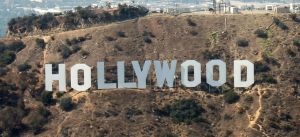
Given the diffusion of new technologies, which facilitate the transmission of new images, and given the increasing cosmopolitanism of major cities, a burning question emerges: why does the magical negro and its minority variations persist?
Okorafor-Mbachu says it’s “not easy to pinpoint the reason why Magical Negroes exist”. Okorafor-Mbachu says that when racism and segregation were institutionalised by law, the magical negro trope reflected the immediate legacy of American slavery. She sees that today the persistence of the Magical Negro is not so conscious but it still reflects unresolved issues of historical racism. Okorafor-Mbachu muses that the producers of these stories probably see themselves as anti-racism advocates.
I see that the magical negro trope is an outcome of the White privilege of storytellers. This term reflects how societies that are dominated by White cultures come to normalise White experiences to the point where people from the dominant group do not immediately recognise how racial relations are set up to benefit them. Even when it is well-meaning, even when it does not come from a conscious desire to denigrate minorities, the magical negro and its variations reproduce unequal power relations between White and people of colour.
The consequence of White privilege as it relates to this long-suffering trope is that the film industry holds conservative attitudes about what they think audiences are willing to pay to go see. Okorafor-Mbachu writes:
I hypothesise that the Magical Negro in film continues to live because a lot of the less savoury beliefs about race are still in the American public’s psyche. And because so much of art these days is commercial, the great machine needs to ‘give ’em what they know’.
The presumption is that White audiences do not want to see people of colour as heroes, and whatever White audiences want Others will accept. This rationale hinges upon the interrelation of race and class constructions. White people are perceived to be more willing to pay to go to the movies, and so film narratives should pander to White audiences… because, presumably, all people of colour are poor and unwilling to pay to go to the movies, don’t you know?
The hypothesis that audiences will not go see movies without White leads has never been properly tested out, as these movies are usually released with a limited distribution. This is not withstanding the popularity of “Blaxploitation” films in the 1970s, and the independent movie industry that grew in the 1980s and 1990s, with filmmakers such as Spike Lee and John Singleton. Narratives involving interesting, complex and fully-fleshed-out Black characters have only rarely been available to mass audiences. Until recently. This may well change very soon.
Technicolour Future?
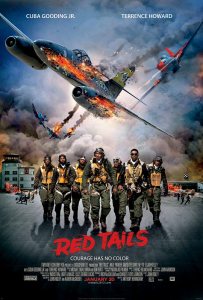
I haven’t seen Red Tails. It may be a good film or it might be just another oversimplified vindication of war that fails to explore the complex morality that soldiers experience during battle. Critics hate it but audiences seem excited about it over on Rotten Tomatoes. George Lucas is a big name producer/director/writer, but the latest Star Wars trilogy was panned by critics. (Especially by Me.) Still, despite his waning allure amongst critics, Lucas’ productions continue to make obscene amounts of money. If the reticence to support Lucas’ latest production was ignorance about what audiences are willing to see, then this is yet another example in a long line where Hollywood is choking off possibilities due to its conservative bigotry.
The magical negro trope has been played by titans of modern cinema (Poitier and Freeman being the exemplars). This character and its other minority variations have (sometimes) been conceived by well-meaning authors (King) and directors (Cameron). Many people, myself included, have enjoyed aspects these well-acted stories – so well might you say: what harm can it do? Isn’t it better to have some Black characters in movies written as sympathetic characters than none at all? No. Not good enough. Not in the year 2012.
The trouble is that even when they are entertaining, major films offer a narrow depiction of who and what minorities are allowed to be. Audiences shouldn’t have to grow up with the attitude that White, heterosexual able-bodied men always get to be the heroes, while women in general, Black people especially, and other minorities can only sometimes take centre stage, under certain exceptional conditions.
Big Hollywood studios decry their waning paying audiences and yet they continue bankrolling and validating stereotypes, rather than telling new stories in interesting ways. Famed American film critic Roger Ebert argues that one of the main reasons film revenue is dropping in the USA is due to lack of variety in the stories being told. In short, the mainstream movie industry underestimates audiences to its detriment. Ebert notes that audiences are in fact willing to pay to watch diverse stories, as evidenced in the rise of the American Netfix subscriptions to foreign-language films.
Thanks to the internet and the proliferation of technology, the days where big studios controlled the bulk of what we saw and how we watched it are probably numbered. New cultural productions online will not necessarily be free of the racist practices that came before, but staying critical about what we watch is a good start. Spike Lee argued that minorities need to get out there and create stories for themselves, so that big studios will not continue disempowering the rest of us. It’s worth remembering Lee’s words: we all need to stay vigilant about the power embedded within images. Mainstream Hollywood limits imaginations and it damages minority groups with condescending, narrow portrayals of culture.
Give us new images, Hollywood. Your tired tropes are hurting us all.
Next time, I’ll talk more about more about the gendered dimension of the noble savage trope, particularly how women of colour are used in postcolonial Hollywood fantasies.
Learn More
* TV Tropes says the magical negro trope is inverted in Shawshank Redemption because Freeman’s character is the narrator, a murderer, and he regains the will to live through his friendship with Robbins’ character. While it is not a simplistic, clear cut example of this trope, I think it fits because Freeman’s character ultimately exists to show the goodness of Tim Robbins’ character. Brookhiser and others agree.
** I see that action movies are an acceptable deviation from the magical negro trope for big Hollywood because these films still rely on the stereotype of the Black macho man, who is a street-smart, loveable rogue. For every film starring a relatively highly paid person of colour, such as Will Smith or Denzel Washington, there are thousands of others where Black people are set up as disposable side characters.
Missing in Action: Military Women
Women have made important contributions during war in various wars around the world and throughout history. For example, refer to the Red Army and the British women who served as fighter pilots in Special Operations (BBC). Plus more American, Australian and British women have enlisted in the recent Gulf Wars (and yes, they face significant struggles in having their status, safety and knowledge officially addressed). In other countries, women have played a major role in insurgencies and armed revolutionary uprisings against the state. The Tamil Tigers are a prime example (see this video report from Al Jazeera). Plus more American, Australian and British women have enlisted in the recent Gulf Wars (and yes, they face significant struggles in having their status, safety and knowledge officially addressed). In other countries, women have played a major role in insurgencies and armed revolutionary uprisings against the state. The Tamil Tigers are a prime example (see this video report from Al Jazeera). Meryl Streep has been talking a lot about Deborah Sampson during her press interviews. I saw her on the Ellen Degeneres Show eloquently questioning why history only celebrates male figures and not women like Sampson. Streep is spokesperson for the USA National Women’s History Museum, which has a page on Sampson. Check out the museum website, it’s great.
Connect With Me
Follow me @OtherSociology or click below!


Reblogged this on Life Full Circle and commented:
This is a great look into how African American characters are developed on the screen. Great Read!
LikeLike
Thanks so much for your interest and the reblog!
LikeLike
and this is why we can’t get as much diversity as we can in ANY form of media, because everyone complains about everything. Oh look, there is a saintly sidekick who happens to be african. That’s racist. You people call everything racist that you yourselves are racist!
LikeLike
I don’t usually allow comments like this but I’m making an exception to exemplify my commenting policy. I often receive abusive comments and highly emotional notes from White people, especially men, who are unhappy that the status quo is being challenged. Discussing racism is not racist. Racism is the systematic oppression of minority groups by dominant groups who benefit from racial hierarchies. This includes racial inequality reproduced by the law, education, health and medical systems, the media and other social institutions. By the way, the logic that “we can’t get as much diversity” because scientific and cultural analyses examine inequality is fundamentally flawed. The phrase “you people” is deployed in racist attacks denoting the speaker sees themselves as a higher status than the person they’re attacking. If you’re serious about diversity and you’d like to better understand how racism works read my academic publications or my articles. Otherwise, check out the books on my suggested reading list.
LikeLiked by 2 people
I approve this message! As a White Person, it has taken me a long time to truly get what White Privilege is. I’m searching for the words to explain it to White Persons who don’t get it, because I still (perhaps naively) believe in truth and understanding. White males are shocked because they feel under attack, and they aren’t used to being confronted. They’ve had a wall of white females protecting them from just that for generations. We were idiots, and being an idiot is a difficult habit to break.
LikeLike
If you write a story where a gay person acts badly, you are gay bashing.
If you write a story where a gay person acts heroically, you have written about the magical gay person.
If you write a story where a “white person” acts selflessly to advance a gay person, your story is patronizing and condescending.
The only story it is possible to write is about is white people oppressing gay people.
Regarding Buck Wade’s comment you write:
” don’t usually allow comments like this but I’m making an exception to exemplify my commenting policy. I often receive abusive comments and highly emotional notes from White people, especially men, who are unhappy that the status quo is being challenged. Discussing racism is not racist. ”
There was absolutely nothing abusive about Buck Wade’s comment.
You were abusive and racist and offensively so in dismissing his comment as abusive and highly emotional, and then generalizing from your assumption about Wade to disparage all White people.
Discussing racism is not racist. Generalizing Wade and then disparaging White people out of that generalization is explicitly racist.
Ma’am, you are a racist.
LikeLike
Oh dear, “some dude who google just let down,” you are very wound up indeed about other White heterosexual men being labelled racist or homophobic. When you’re more concerned about being called out for discrimination than actual acts of hate speech and discrimination, then your concern is not really about supporting inclusion, is it? It’s actually the exact opposite.
Yes, writing a story “where a gay person acts badly” is a form of homophobia, since mainstream representations of gay people are negative. A story “where a gay person acts heroically” would be terrific! It is not an example of the “magical gay person” as you call it. The magical queer trope which I’ve referenced is actually where a gay character is constructed to make heterosexual protagonists seem more heroic. They are not given their own story arc; they are devoid of meaningful sexual or romantic relationships (so their sexuality is rendered invisible); and they reproduce stereotypes about gay people. So that you can understand this a bit more clearly: negative stereotypes are not helpful and they perpetuate the otherness of LGBTQIA people.
Stories about White people oppressing gay people are not useful to anyone, except to your irate sensibilities, apparently. While it’s clear you think it’s incredibly noble to use gay people in your racist rant, you have managed to reproduce both homophobia and racism in one long verbose attack. How brave of you, anonymous White worrier!
Buck Wade’s comment is abusive because he came to my blog to call me racist simply because I write about anti-racism. You’ve done the same thing. Not only are you unoriginal, you cannot even see the flawed logic of your bias. Writing about the sociology of racism is not an act of racism – something you do seem unable to grasp. I’ll break it down a bit more for you: racism is a concept describing social hierarchies that position some groups as being superior to others. Racism is maintained by social structures of power (including the media) as well as in social interactions. In this case, White men who think they can come to a sociology blog with nothing but Big Emotions about not wanting to be called racist while engaging in racism.
Racism without racists is a fallacy. Rather than getting upset that sociologists are fighting racism through public education, you might consider thinking critically about your White male privilege, and exploring your White male anger and misplaced sense of entitlement. White men don’t get to tell racism experts what is and isn’t racism. A better use of time might be to put aside your fear and loathing and making the world a better place.
LikeLike
The same old tired responses. When a white person challenges your statements, even non-violently, they must be an angry white male, with a sense of entitlement. What an incredible quote: “White men don’t get to tell racism experts what is and isn’t racism.” Wow! The usual refuge of the self-important PhD: “I know everything better than you, how dare you question me?” Considering yourself an “expert” doesn’t make everything you say true. Get over yourself.
LikeLike
Hi Jeff. I am an expert, and one who cites peer review research. Personal opinions and emotions do not count as research evidence.
LikeLike
“White men don’t get to tell racism experts what is and isn’t racism.” Wow! Are we a little self-important? Get over yourself!
LikeLike
Hi again Jeff. I can see you feel deeply about racism. It’s probably best to channel that energy into a positive program to improve society.
LikeLike
Hey there, White Guys. Even before I was socially aware of the difference between being able to not think about life and having to wonder if you’d die at a traffic stop, guys have argued for their right to not know and not care about any given thing. Do you know how tiring that is to hear? Stop breathing for two seconds and think about what I just said. Think about the possibility that there are things you don’t actually know. Be open to the idea – no, really, really open. You don’t get to tell the victim when to stop hurting. You don’t get to be a victim, too, just because you read about it. I’m sure you’re really okay; you just need to stop talking and think for a minute.
LikeLike
While I agree with what you are saying, I argue that as the role played by Morgan Freeman in Shawshank was intended for to be an Irishman, as noted in the book (the jokey dialogue still left in the film, “I guess it’s because I’m Irish”), that probably disqualifies the film from this trope. Whoever played that character would have had the same characteristics.
LikeLike
Hi Robby,
The film is not the book. It matters that the film character is played by a Black actor. I address this in my post. See the “Learn More” section.
LikeLike